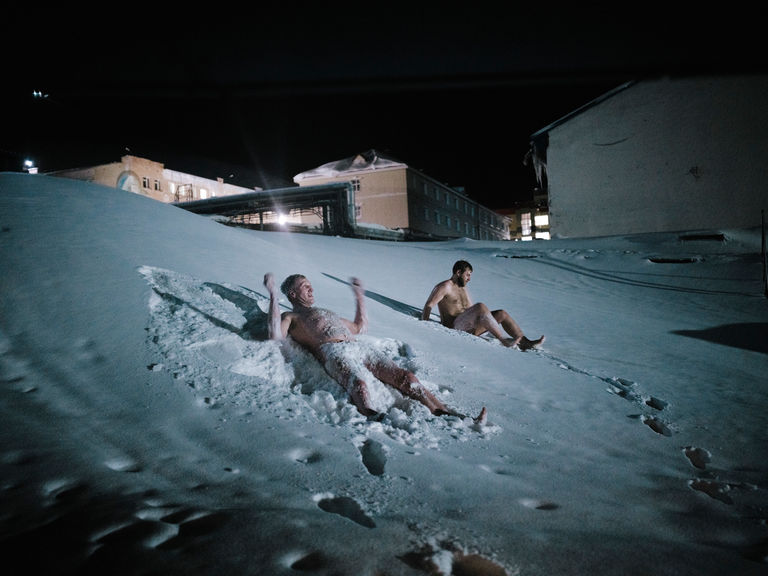Project Detail: Arctic Dreams
Contest:
Swiss Storytelling Photo Grant 9th
Brand:
LuganoPhotoDays
Author:
Mario Heller
Status:
Winner
Project Info
Arctic Dreams
There is a tradition in Barentsburg: Whenever you are on the mainland, you should hug a tree because you will find none of them here. The Russian settlement on Spitsbergen in the Arctic is so remote that reaching it is only possible by helicopter, snowmobile, or ship - if the extreme weather allows it at all. Because of the permanent danger from polar bears, leaving the village without a rifle is forbidden. In winter, Barentsburg sinks into months of darkness; in summer the sun shines around the clock. The population consists primarily of Ukrainian miners and young urbanites from Russia. They live in a close-knit community where everyone knows each other. Who are the people who have chosen to live in this strange place? And how do they manage to coexist peacefully in times of political tension?
The dark blue Mi-8 helicopter skims over the endless world of snow and ice. About twenty Russians are crammed in on their way back from their regular football game with the neighbouring Norwegian town of Longyearbyen, as if it is the most normal thing in the world to be flown home from a local sports tournament in a helicopter. The showdown with the Norwegians ends almost every time in defeat, but it is a long-standing tradition. Barentsburg had existed since the Soviet Union and was founded in 1932 - when Stalin was massively pushing industrialization, and the demand for coal was insatiable. At its peak, almost 2400 people lived in Barentsburg and the now-abandoned village of Pyramiden. There were even greenhouses and a farm - a bizarre idea given the barren tundra vegetation on the archipelago.
The helicopter lands and the passengers get off. Some express their gratitude to the three pilots through the open window, hands are shaken. Nowadays only about four hundred inhabitants live in Barentsburg. The ravages of time have turned the greenhouses into ruins. A bust of Lenin stands enthroned on the village square, watching over Barentsburg sternly. Behind it is a monument with Russian lettering: Our goal is communism. It is an ambitious goal for a settlement that only gets fresh vegetables delivered once a month - if at all. Because of the war, Norway threatened last year not to let any more ships into Barentsburg. Russia reacted furiously and referred to the Spitsbergen Treaty of 1920, which allowed all peoples of the 46 signatory states to live and work here. (Russia is the only country to have excercised its right to do so)
Despite the difficult conditions, the spirit of communism lives on in Barentsburg - in a positive sense: even strangers greet each other on the street at any time of day. The apartments in the four prefabricated buildings are identically sized and furnished: Singles have small, cozy one-room flats, and couples and families have one extra room. In the canteen, the chefs cook simple Russian meals three times a day. The only supermarket in the village sells the same cheap groceries for everyone. Payment is made with a local credit card - the Spitzcoin, as people jokingly call it. The amount is deducted directly from the salary.
"Barentsburg is like a spaceship: there is everything you need, but you can't escape from here," says Vitaly, the general practitioner at the hospital. Outside, it is already dark again, only 2 pm. The vast complex looks empty. "We don't have a single inpatient," he explains, pushing up his glasses. Vitaly had only recently moved here from St. Petersburg when it had been dark in Barentsburg for weeks. "At night, I dreamt longingly of the sun. It was surreal," he says with a laugh. Besides Vitaly, only his supervisor from Tajikistan works at the hospital, alongside a dentist and two nurses. The hospital is closed on weekends. "If you have to die, please wait until Monday" is a popular joke among the people of Barentsburg. But Vitaly and his colleagues have a big responsibility. The nearest major hospital is on the Norwegian mainland, two and a half hours away by plane. "We can't just send patients to the next doctor. We must make the diagnosis ourselves - and it has to be correct."
Vitaly has a contract for two years. What follows after that, he doesn't know. "The situation at home makes it hard to think about the future." Vitaly addresses a taboo subject treated in Barentsburg like Lord Voldemort's name in Harry Potter: the war in Ukraine here is known better as "the current situation." Why is there such silence about it? "Everybody has different roots. We have 380 views on the subject here," Vitaly explains cautiously. The Russian culture of avoiding political issues has a very long tradition. "If you care about your digestion, I'll give you this good advice: don't read Soviet newspapers before you eat," is a quote from Bulgakov's 1925 novel Dog's Heart.
There is a knock at the door of Vitaly's practice, and the helicopter pilot Marat pokes his head in. The two speak in Russian, and the topic of politics immediately fades into the background again. In the morning, Marat was flying his helicopter in uniform; now, he's here as a patient in casual clothes. Life in Barentsburg is a bit like a sitcom: being a small community, people often bump into each other several times a day. Sometimes the encounters seem scripted. There are no secrets here. Most people do not even lock their flat doors. In the evening, people arrange to meet for sports, cinema, or sauna via the local Telegram group, and at the weekend, they go hiking together.
Of course, no one came to the Arctic to socialise. For the miners, for example, Barentsburg is one thing above all: lucrative. And a stable home, far away from the war in eastern Ukraine that has been going on for years. "Barentsburg feels to me like a safe haven in this raging world," says Alexander Yatsunenko. The 45-year-old miner from Luhansk has just finished his shift at the coal mine. His good-natured face is blackened by coal dust. He is lanky and has short, grey hair. When he speaks, he stutters slightly, but that only makes him more likeable. He has a clear stance on the conflict in his homeland: "We are all Russians. There is nothing to separate."
Faded posters from the Soviet era praising the miners' pride hang on the wooden corridor's walls. Alexander turns off the torch attached to his red helmet and brings the equipment into the office. He hastily drinks a glass of water. Living in Barentsburg pleases him, despite the complex and dangerous work in the shaft. "My work feels meaningful. I am doing the right thing for the right people," he says. Coal mining is in his blood: his father and grandfather were miners. Five years ago, he came to Barentsburg. His experience is in demand here, and his salary is up to three times higher than in Ukraine.
Ironically, coal mining in Barentsburg is completely uneconomical: only 120 000 tonnes of coal are brought to the surface yearly. More than twice that amount would have to be produced to make a profit. The settlement uses a quarter of the coal to supply electricity and heat. Mining in the Arctic permafrost is difficult: the deeper you dig, the colder it gets. The miners travel by mine train up to 500 meters below sea level. A trip can take up to two and a half hours. In the past, there have always been accidents.
Nevertheless, Russia is maintaining its presence in Spitsbergen. Under the metre-thick ice layers of the North Pole, only about 1000 kilometres away, lie 20 to 30 per cent of the world's oil reserves and up to 47 trillion cubic metres of natural gas are also suspected as rich deposits of mineral resources such as gold or platinum. Russia wants to be leading the race to exploit the Arctic’s resources and the research centre in Barentsburg contributes by monitoring the impact of climate change in the region. The first ice-free summer could come in 20 years when the coal should be exhausted. What will become of Barentsburg then?
"Tourism will determine the future of Barentsburg," Ildar Neverov is certain. Since last year, the 42-year-old Muscovite has been the director of Arktikugol, the Russian operator of the coal mine in Barentsburg. He is thus also something like the mayor of the village. Elegantly dressed, he sits at the huge meeting table in his office, his gaze stern. The company is state-owned: a portrait of Putin hangs on the wall, and next to it is the Russian flag. But Ildar doesn't seem to care much about politics. For him, Barentsburg is an exciting challenge: "I could be sitting in a fancy office in Moscow, but Barentsburg is one of the craziest places in the world. The northernmost coal mine in the world. The northernmost harbour in the world. The world's northernmost swimming pool. There are only superlatives here!" he says with shining eyes. His big dream is for Tom Cruise to film the new part of Mission Impossible in Barentsburg. He would love to make the little village world famous.
If only there wasn’t a boycott of the tourism organisations in the Norwegian town of Longyearbyen. Since the beginning of the conflict, people have been advised not to visit Barentsburg. The Norwegians argue that they are directly financing the war in Ukraine while the Russian community believes that Norwegian companies are using politics to gain an economic advantage. According to a poll taken after the war began, only slightly more than half of the Norwegian population in Spitsbergen supports the boycott. In Barentsburg, this leads to absurd situations: A young woman is employed to open the souvenir shop ifive days a week - although there are practically no tourists, and if they wanted to buy anything they can’t use a foreign credit card. Even for Russians, it is almost impossible to travel to Barentsburg. Whereas there used to be weekly charter flights from Moscow, today, you must take the long way via Saint Petersburg, Estonia and Finland because of the closed airspace.
Ildar, too, is ambivalent on the subject of politics. He is very disappointed with the journalists from the West who covered Barentsburg last year. "They were biased and ended up spreading lies about our link to the political situation," he says. But the matter doesn't let him go: "We have hired many new people to work in tourism. If no guests come again this year because of the sanctions, it will be a frustrating season for all of us," he explains. Still, the money flow from Moscow seems assured - whether tourism generates profit or not. "It's not the end of Barentsburg, just a difficult period. The same foreign policy tensions existed when the Soviet Union invaded Afghanistan, for example. It will pass," Ildar believes.
Barbara Mokstadt works in the mint-green museum, one of the most beautiful buildings in the village. The 30-year-old woman from Moscow has recently become the director of the museum. She wants to realise Ildar's vision: Barentsburg as a vast, walk-in museum. However, she is less calm about the situation in her home country than her boss. "It is unimaginable for me to live in Russia again. Even a year after the war started, I can't believe that all this is happening," Barbara says. Still, she can't imagine life without her homeland: "I love my country, the language and the people." Barentsburg, a Russian community on European soil, seems like the ideal compromise.
For Barbara, the people in Barentsburg live in a parallel world. Being far away from Russia, it is even easier to ignore the war. "All conversations here are like walks across minefields. You have to move forward very carefully and find out what the other person thinks about the war," she says. The community is so tiny that no one can afford to live in conflict with each other. And the few people who have taken a clear stand against the war have long since moved away.
However, the population turnover is not only driven by political disagreements. The young people who work in tourism usually don't stay longer than a year or two. "For many, Barentsburg is an adventure to brag about back home later," says Barbara. However, many also run away from something and use Barentsburg for a fresh start. A few weeks ago, Mikhail lost his job, and now he is a coach at the local sports complex. His relation to the conflict has an entirely different dimension: "If it comes to war between Russia and NATO, then I can choose between two bad options: Either I fight for Russia in the war, or I end up in a concentration camp in Norway," he is convinced. He even knows of young men in Barentsburg who have received a draft notice for the army at their home address in Russia. But Mikhail does not believe that he will also receive such a letter. Fortunately, he says, the war has not yet escalated to that point. His contract expires in May. What will happen next, he does not know yet. "I could probably extend the contract, but I might travel around Norway for a while and consider my options”.
The Day of the Defender of the Fatherland is an important holiday in Russia, which has a special meaning in Barentsburg as well. Most of all, it reminds everyone of the importance of community. The miners organise a boisterous party on the village square and serve the Tajik national dish, Plov, and vodka from Belarus, which they have unceremoniously labelled "Barentsburg Vodka". Not far from the village square, the younger people inaugurate the world's northernmost skating rink; the consul cuts the red ribbon and everyone cheers. The idea came from a resident. Ildar was thrilled and immediately made it happen. People are already dreaming that someday stars from the American NHL will play here. In the evening, they prepare shashlik, dance and hug each other. The world keeps turning, but in Barentsburg, it turns by different rules.


















